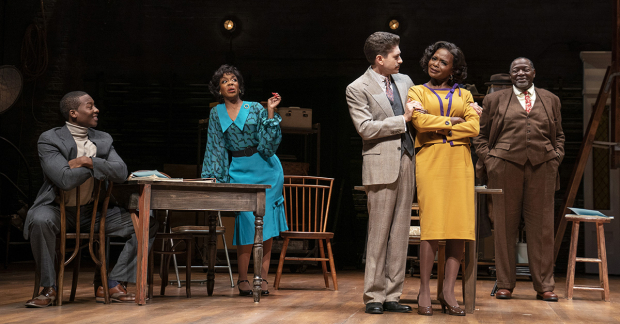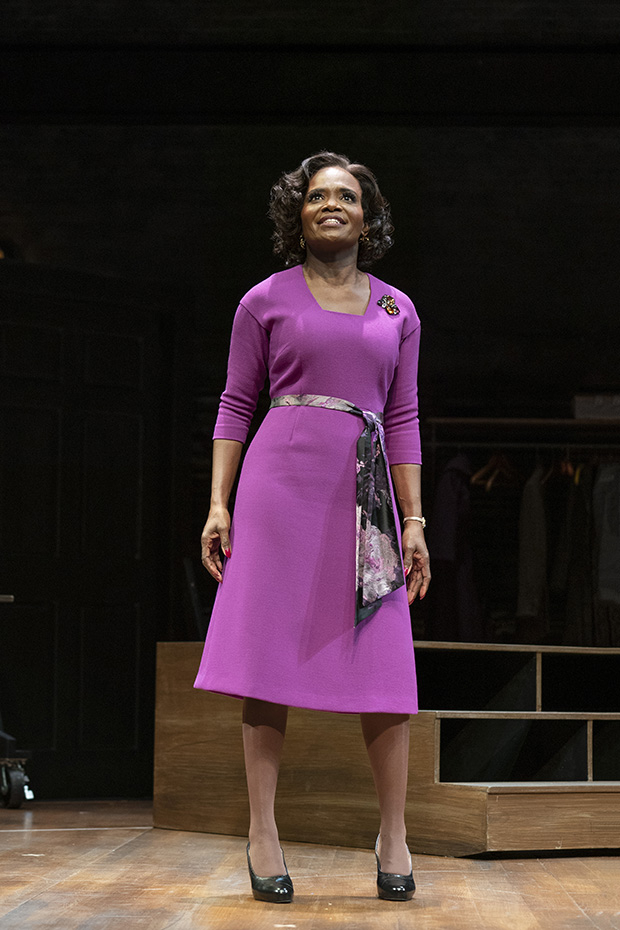Review: LaChanze and Chuck Cooper Astonish in Alice Childress's Monumental Trouble in Mind

(© Joan Marcus)
I left the American Airlines Theatre on Sunday afternoon with the word "monumental" in my head. In thinking about Charles Randolph-Wright's loving new production of Alice Childress's 1955 dramedy Trouble in Mind, and particularly the performances of Tony winners LaChanze and Chuck Cooper, I just couldn't shake the idea that I had witnessed a theatrical legend in the making. You hopefully will, too.
It's fitting, since Trouble in Mind has been the stuff of theatrical mythology almost since its debut. The play is about a Black actor who refuses to compromise her integrity in the face of her white director even if it means sacrificing a major opportunity. In real life, Childress was forced to revise the ending of her play at the behest of her white producer, who threatened to cancel its off-Broadway premiere if she didn't make the conclusion a little more upbeat. Childress would go on to regret her decision, and when the work was optioned for Broadway a few years later, on the condition that she'd make further revisions that continued to diminish its anti-racist stance, she refused. The Broadway run never happened, and Trouble in Mind has pretty much spent the ensuing six decades in the library stacks, with Childress herself becoming one of the great albeit relatively unknown playwrights of the 20th century.
This context, helpfully provided via an announcement before the show, goes a long way in setting up what we're about to see. A chilling look at racism in the theater industry, Trouble in Mind stars LaChanze as Wiletta Mayer, a middle-aged actor who has spent her career playing subservient roles and is now hoping that the anti-lynching drama Chaos in Belleville will provide her with a more substantial part. However, the deck is stacked against her and her co-stars (Cooper and Jessica Frances Dukes as seen-it-all vets Sheldon and Millie, and Brandon Micheal Hall as newcomer John); the play is written and staged by white people. When Wiletta stands up for her belief that the thrust of the work is a lie — why would a Black mother send her son out to face a lynch mob? — the ensuing argument with her condescending director Al Manners (Michael Zegen) threatens to doom the entire production.

(© Joan Marcus)
Some will call Alice Childress prescient, but what is prescience when the events depicted have been occurring for centuries? That's what makes this dynamite play even sadder — after 60-some years, Trouble in Mind couldn't be timelier if it were written yesterday, and the events, particularly the climactic argument between Wiletta and Al, are as explosive and subversive now as they were in the 1950s. Randolph-Wright gets that, and, more importantly, he deftly brings to life the piece's slyly shifting tone. His actors, rounded out by Don Stephenson, Danielle Campbell, and Simon Jones, deliver the comedic aspects without pushing, and when it comes time for it to veer into truth-telling, it tears your heart into a thousand pieces.
Case in point, a mid-show monologue where Sheldon discusses what it was like to actually witness a lynching and how that particular scar never heals. It is an astonishing piece of writing, beautifully lit by Kathy A. Perkins, that Cooper delivers with tears running down his face and his body hunched, the words filled with poignancy, grace, and trauma.
So, too, is the work of LaChanze. Bedecked in Emilio Sosa's vibrant costumes, her work is especially vulnerable. Strolling around the theatrical backstage created by scenic designer Arnulfo Maldonado, you can see the fear behind her eyes, the muscles she's forcing to make herself smile. She turns Wiletta into a human pressure cooker that's filled up a little too high — you know she's going to explode, it's just a matter of when. Both of these performances are absolutely masterful and some of the most thrilling acting I've seen since theater reopened last summer. I'll be thinking about them for a long time.
Childress didn't live to see Trouble in Mind finally make it to Broadway — she died in 1994. But she's there in her own way. This play continues a conversation about equity that needs to be had, particularly in an environment like the theater, where so often, people are abused on the quest to make great art. And even though it was written in 1955, there's nothing outdated about it.











